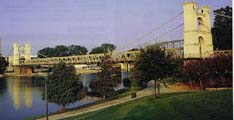
|

|
Waco overcame Mount Carmel stigmaLinda Ethridge |
|
In 1993 the shoot-out and prolonged FBI siege the Branch Davidian compound at Mount Carmel placed our city in the bull's-eye of public scrutiny around the world. Cults, guns, sex and religion in a Texas setting seemed to invite stereotypical reporting of the stand-off and of Waco. As Waco citizens gathered around their televisions following the initial federal raid, we were asking the same questions people around the world were asking. Who were these Branch Davidians? Why in the world were they stockpiling weapons? Later, as the story unfolded, were the children OK? And then, why don't they come out? As we, along with the world, struggled to comprehend the events and the players involved, we missed at first what this might be doing to Waco's image. No one knew then how long the standoff would last and no one anticipated the tragic fiery end that would later come. As the stories and images of the siege played over and over around the world, we realized we were faced with a unique situation. How should we react to the tragedy that was unfolding outside our city? What message should we try to convey to the world? In many ways the community responded well to the challenge. Then-Mayor Bob Sheehy was a gracious presence, fielding questions and managing numerous interviews. Waco citizens impressed our many visitors with their warmth, natural friendliness, and helpful attitudes. The sheer beauty of the town, particularly our river, amazed first-time visitors. Our ability to come across well with our many unexpected guests did not, however, translate or carry over to the images repeated over and over to the world. To the world, Waco became associated with the terrible events at Mount Carmel. For some, it became a place to be shunned and ridiculed. Was that fair? No, of course not. But it was the reality. And our protestations that this didn't actually happen in our city meant nothing. |
It is ironic that the Bush ranch is about the same distance from Waco as the Mount Carmel site but seldom gets the Waco byline. It may be that positive associations don't have the same sticking power as negative ones do. What has been the long-term impact on our city's psyche and its fortunes? On the latter, Waco has done rather well. Population growth has been steady. Waco is a good place to live, work and play. Families thrive here. Businesses do well here. Employers are able to hire quality workers who have the skills and the work ethic companies crave. New businesses are finding their way here as evidenced by recent announcements from Wal-Mart, Tractor Supply, Free Flight, ACT-I and others. Exceptional educational opportunities are available here. Quality of life is superb. We have the good life without having to wait in line for it. Could we have grown more or had more success without the stigma of the Davidian publicity? Maybe. We simply don't know who may have scratched us off their list of communities to consider. But we do know that when we have a conversation with prospects, any such stigmas are easily overcome, and they know where Waco is. We have a good story to tell and Waco sells itself well. I am extremely confident about the future of this community. As for our psyche — has our view of ourselves and our town been changed by the Davidian tragedy? I think not. Most citizens have a deep and abiding affection for Waco. We know its strengths and its flaws. No matter how others might choose to stereotype us, we are happy to live here in the boundless and deep Heart of Texas. It's a heart full of sympathy when senseless tragedy strikes, a heart full of confidence and enduring hope for a bright future for our hometown. Linda Ethridge was Waco's mayor from 2000-2004. |
|
Return to First Person home page |
|